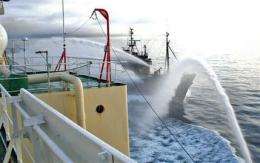Whalers, activists clash again in Antarctic waters

(AP) -- A group of conservationists threw bottles of butyric acid at Japanese whalers and blasted their ship with paint balls, while the Japanese fired water cannons in their latest Antarctic Ocean clash, both sides said Thursday.
No one was injured in Wednesday's confrontation, the most recent in a string of increasingly aggressive clashes between U.S.-based activist group Sea Shepherd and the whaling fleet. Japan condemned the conservationists' actions as dangerous and violent. Sea Shepherd said they are simply doing what is necessary to protect whales.
Sea Shepherd has long used butyric acid, produced from rancid butter, in their annual fight to stop the whalers and maintains that the substance is nontoxic.
Earlier this month, Japan claimed three crew members on one of its whaling vessels suffered face and eye injuries from an acid attack.
"We don't throw acid on them - we throw rotten butter, which technically is butyric acid," Sea Shepherd founder Paul Watson told The Associated Press by satellite phone from the Antarctic on Thursday. "We've been throwing rotten butter at them for five years."
Watson said his crew also shot paint balls at the Nisshin Maru to cover up a sign that said "research."
Japan hunts hundreds of mostly minke whales - which are not an endangered species - in Antarctic waters each year under its whaling research program, an allowed exception to the International Whaling Commission's 1986 ban on commercial whaling. Whale meat not used for study is sold for consumption in Japan, which critics say is the real reason for the hunts.
Glenn Inwood, spokesman for Japan's Institute of Cetacean Research, which sponsors the whale hunt, called Sea Shepherd's use of paint projectiles dangerous.
On Monday, Sea Shepherd activist Peter Bethune jumped aboard the Shonan Maru 2 from a Jet Ski with the stated goal of making a citizen's arrest of the ship's captain and presenting him with a $3 million bill for the destruction of the Ady Gil.
He was taken into custody by the whalers and will face charges in Japan of trespassing and assault.
"If they hit somebody on the boats, they could easily kill them," Inwood said.
Earlier this month, Sea Shepherd's ship the Bob Barker and a Japanese harpoon boat collided, causing minor damage to both vessels. On Jan. 6, a Japanese whaler struck Sea Shepherd's high-tech speedboat Ady Gil, which sank a day later. No one was seriously injured in those incidents.
©2010 The Associated Press. All rights reserved. This material may not be published, broadcast, rewritten or redistributed.
















